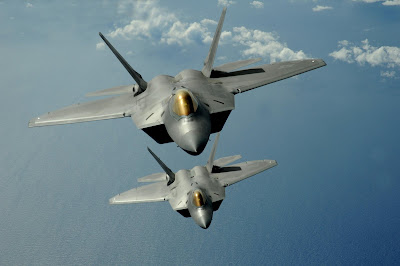The U.S. Air Force expects to get the green light to start purchasing biofuels by the end of 2012, if industry can make the alternative fuels at a cost-competitive price. Tests have shown fighter aircraft and cargo planes can fly on a blend of biofuels and traditional jet fuel with no sacrifice in speed or performance.
The US Air Force is ready to switch to biofuels to help power its warplanes but the price of alternative fuels remains too high, military officials said Tuesday.
Anxious to reduce its reliance on oil, the Air Force has approved the use of synthetic fuels for nearly all its aircraft and expects to get the green light for biofuels by the end of 2012, Undersecretary Erin Conaton said.
"The big thing we're trying to do is to send a clear message to industry that the Air Force wants to be in a position to purchase biofuels and to use that operationally for our fleet," Conaton told AFP.
 "But in order to do that, we need industry to be able to produce in the quantities we need at a cost-competitive price."
"But in order to do that, we need industry to be able to produce in the quantities we need at a cost-competitive price." Biofuels cost a prohibitive $35 a gallon, about 10 times the price of conventional jet fuel, or JP-8.
"The biofuels that are available now are just nowhere near the cost of what we can buy JP-8 for," Conaton said.With the biofuels industry still in need of more private investment, the US military has joined forces with commercial airlines "to try to send the right message" to the alternative fuels industry, she said.
"We're ready whenever they're ready to produce it."
Tests have shown fighter aircraft and cargo planes can fly on a blend of biofuels and traditional jet fuel with no sacrifice in speed or performance, she said.
Conaton spoke as biofuels industry representatives and military officials gathered for an energy conference Tuesday in Washington where alternative fuels will feature high on the agenda.
U.S. officials see the country's dependence on foreign oil as a national security risk and an increasing financial burden.
To promote energy "security," the Air Force has set a goal to have half of its domestic fuel needs drawn from alternative sources by 2016.
The biofuels tested on military aircraft, known as hydroprocessed renewable jet fuel, are derived from the camelina plant, animal fat and various waste oils.
 The military and commercial airlines are also testing "alcohol-to-jet" fuel produced from cellulosic feedstock, including switch grass, grains and sugar.
The military and commercial airlines are also testing "alcohol-to-jet" fuel produced from cellulosic feedstock, including switch grass, grains and sugar. Conaton said the Air Force had plans to test the ATJ fuel on A-10 ground attack aircraft.
Following the Air Force's lead, the Navy and Army are also working to promote the use of alternative fuels in ships, ground vehicles and bases, with Navy Secretary Ray Mabus arguing that the military can help generate enough demand to lower the price of biofuels.
Mabus told NPR earlier this month that "if we establish the market, the price is going to begin to come down." The Air Force's consumption of fuel is equivalent to a major commercial airline, or about 2.5 billion gallons a year.
by "environment clean generations"






 Posted in:
Posted in:
0 comentarii:
Post a Comment